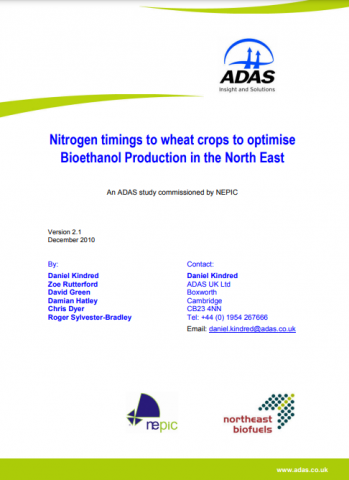Abstract
A NEPIC sponsored study (Clarke et al., 2008) provided information on growing wheat for bioethanol production in the North East, especially with regard to variety choice and nitrogen (N) management. A lack of N fertiliser response data in the North East was noted, and experimental evaluation of the use of N timing to optimise grain quality for bioethanol was recommended. As a result further work was sponsored by NEPIC and is reported here to test whether growers can apply fertiliser N (N) earlier to reduce grain protein and increase the alcohol yield. Four N response field experiments were set up in 2009 and three in 2010 comparing ‘normal’ with ‘medium early’ and ‘early’ N strategies. For each N response trial grain yields were measured by combine harvester and grain quality tests included grain protein content, specific weight and predicted alcohol yield. N response curves for grain yield, grain protein and alcohol yield per ha were fitted and optimum N rates for each site and timing calculated. Results showed significant yield advantages of over 0.5t/ha for earlier N application at two of the seven sites, both second cereals with low soil N supplies. There was no deleterious effect of early N timing on grain yield at any of the sites. Applying a greater proportion of N early increased alcohol yields per tonne at 6 of the 7 seven sites, overall improving alcohol yields from 444 to 448 litres/dry tonne. Differences in alcohol yield between N rates were much greater, reducing from 466 at nil-N to 437 l/t at the highest N levels, but the large effect of N rate on grain yields meant alcohol yields per ha were more than doubled by applying fertiliser (1800 to 4000 l/ha overall) and optimal N application rates for alcohol production were only 9% lower than for grain yield. Early N timing increased alcohol yields per ha overall by around 100 l/ha. Only small effects were seen of N timing on specific weight or thousand grain weight, which would not affect value for alcohol production. Evidence from this study and previous work suggests that applying up to 50% of the N earlier in the season would generally reduce grain protein content & increase alcohol yields per tonne, without negatively affecting grain yields, and perhaps in second cereal situations, increasing grain yields. In conclusion, recommendations can be made in low lodging-risk situations that applying a greater proportion of N fertiliser early should moderately improve grain quality for bioethanol production without reducing grain yield. Furthermore, early N applications in second wheat situations may benefit both grain yield and quality. However, all timing experiments in recent years have been conducted in dry springs, the increased risks of lodging and fertiliser N loss to leaching or denitrification from earlier N timing in a wetter year are still unquantified.






